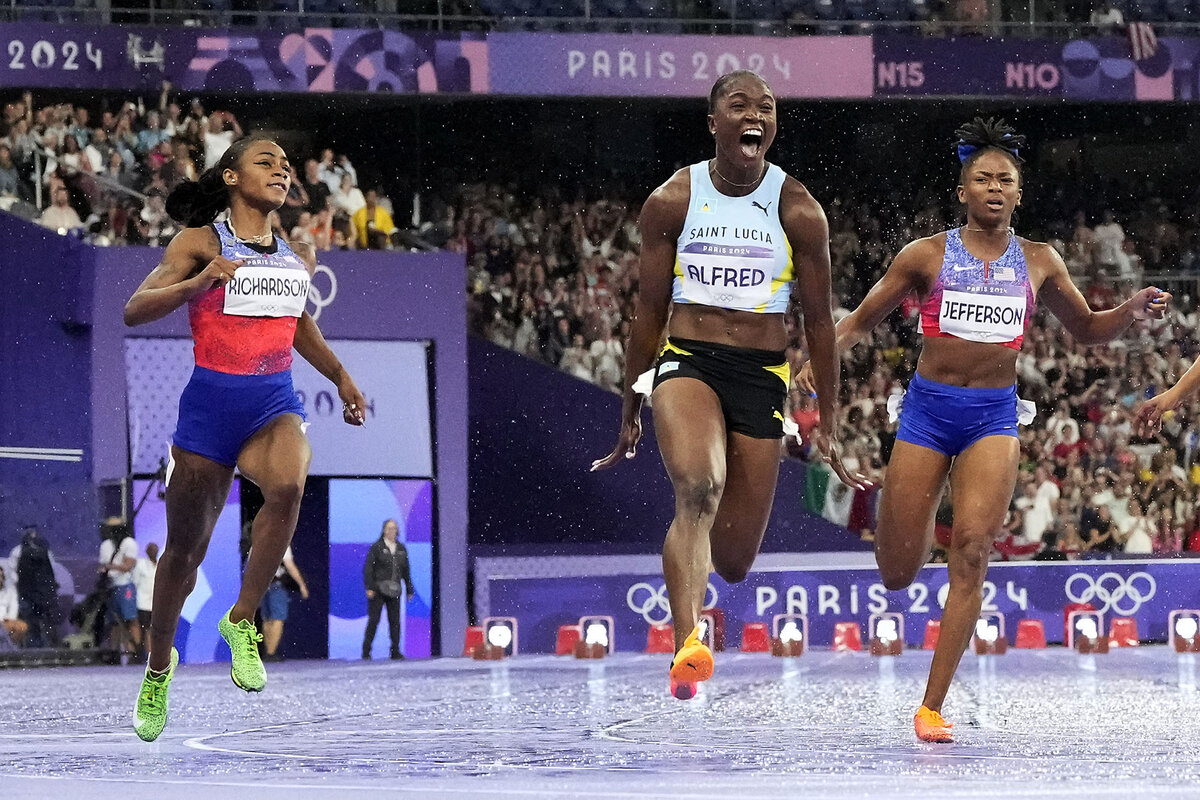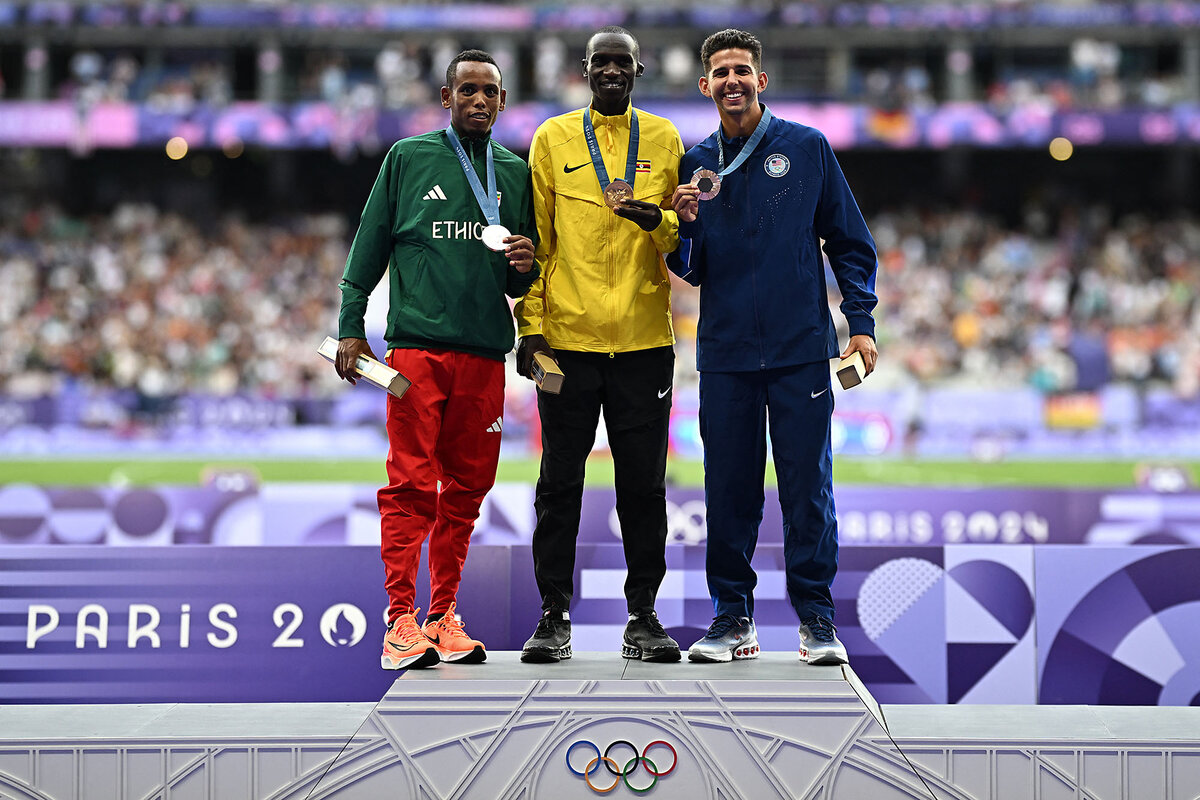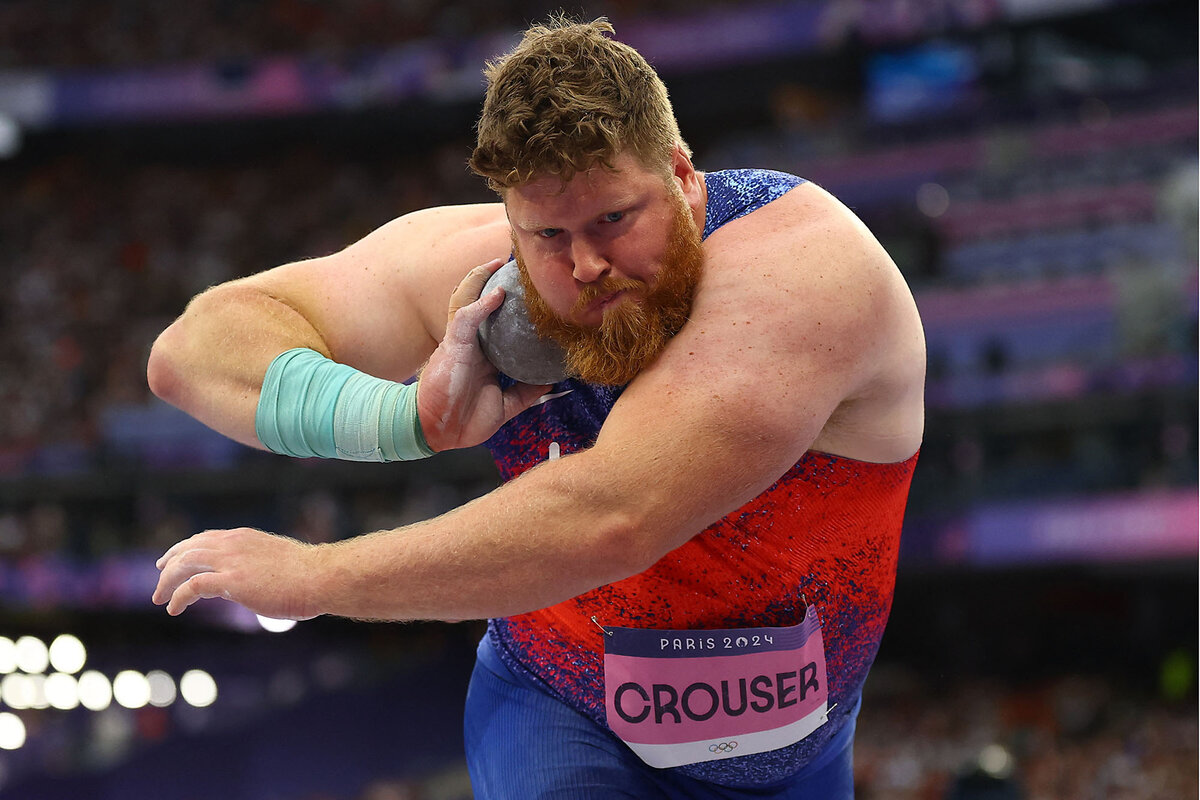Whether 9.79 seconds or 30 minutes, Olympic track and field races inspire awe
Loading...
| Paris
The U.S. track and field delegation’s talent was deep, long before they landed in the City of Light and started racing up the podium.
Their opening weekend wins came in bronze, silver, and gold. Their stories are of nail-biting firsts and of perseverance.
Noah Lyles’ performance in the men’s 100-meter sprint Sunday night was the race seen around the world – a cliff-hanger that came down to five-thousandths of a second. By strategically leaning in at the finish, he edged out Kishane Thompson of Jamaica, the favorite to win, and became the first American sprinter to earn gold in the event since 2004. The two medalists had to wait many times longer than it took them to run their race to find out who came first.
Why We Wrote This
A story focused onTeam USA’s track and field members, from Noah Lyles to Sha’Carri Richardson, are known for their perseverance. Over the weekend, those stars, plus a host of other U.S. athletes, showed how they manage the pressure of a world stage.
Mr. Lyles, a believer in “speaking things into existence,” was not shy about talking ahead of time about his ability to win.
“It feels good to back it up,” he said at a press conference after achieving his goal, which took all of 9.79 seconds. “I’ve done a lot of work throughout the last three years since 2021,” he added, referring to several physical and mental health setbacks ahead of the Tokyo Olympics, where he qualified to represent the U.S. in the 200-meter event, but not the 100-meter.
The Americans – and others in a mesmerizing field of athletes competing through obstacles including war – delivered must-watch performances throughout the weekend.
On Saturday, Team USA’s Sha’Carri Richardson, who was disqualified from competing in Tokyo because she tested positive for THC, redeemed herself with a silver medal in her signature 100-meter race. Ms. Richardson easily got the loudest applause from the Stade de France crowd during the semifinal and final races – a huge contrast from the online vitriol she faced in 2021. She battled a wet track, finishing behind Julien Alfred, who won the first ever Olympic medal for the Caribbean country of Saint Lucia. American Melissa Jefferson won bronze.
Watching Ms. Richardson hoisting the American flag around her shoulders with a big smile was a coda for her journey. Instead of shrinking from the battle to get to the Olympics, she worked hard every year since, winning in every competition, to qualify for Paris.
In a weekend of stand-out events, one from Friday night was a highlight for me. American Grant Fisher reached the podium in the men’s 10,000-meter event. His bronze was the first medal for the U.S. in that event since London in 2012 – and the first at these Games for the U.S. in track and field. For almost 27 minutes (more than 6 miles) he trotted near the front of the line, his stride never allowing him to fall less than sixth in line. He punched his way close to silver before a last minute burst from Berihu Aregawi of Ethiopia finished the race.
This event was unique because it kept the attention of fans for almost 30 minutes. They cheered the entire time – their chants like magnets – intensifying depending on the location of the pack of runners on the field during their 25 laps. I don’t know how the body can do such a thing: work as hard as an automobile, invisible breaths from heaving chest like exhaust pipes. This race, at this length, while keeping his pace, was the perfect example of Mr. Fisher’s perseverance, pushing himself to be the best version of himself until the end.
“I’ve always been on the outside looking in with the medals,” Mr. Fisher reflected after the race. He said he was often told from a young age he wouldn’t be able to compete with competitors from top programs in Africa and Europe. “I hope that I showed that I’m capable of that.”
Everywhere you looked this weekend, though, there were accomplishments. At the same time the final roster in the men’s 100-meter was being decided on Sunday, Ukrainian Yaroloava Mahuchikh was wowing the crowd with her soaring high jumps. With each bar raise, you wondered: Will she make it? She dedicated her gold medal win to those athletes and coaches, nearly 500, who died in her country’s war with Russia. Another Ukrainian, Iryna Gerashchenko, was also on the podium with Ms. Mahuchikh, sharing a bronze medal with Australia’s Eleanor Patterson.
The day before, on Saturday night in front of a packed crowd and a backdrop of falling rain, Jasmine Moore became the first American woman to win a medal for the women’s triple jump when she secured the bronze. Thea LaFond, who won gold, became the Caribbean island Dominica’s first ever Olympic medalist.
U.S. shot put champion Ryan Crouser was masterful in his performance. The roaring crowd was his personal soundtrack. Every time his name was mentioned, Mr. Crouser walked to the shot put ring, raised his right hand in the air, placed his shot put against his chalky neck, spun and hurled it. He obliterated the competition on his first toss of 22.64 meters. No one, in six tries, could match it. Meanwhile he threw further the next two times at 22.69 and 22.90. Mr. Couser is so dominant in the sport that he didn’t come close to his Olympic or world records of 23.30 and 23.56 respectively. His competition was fellow American, Joe Kovacs, now a three-time silver medalist, and Rajindra Campbell of Jamaica, who took bronze, and became his nation’s first shot put medalist.
With his six throws, Mr. Crouser wove himself into the history of the event, becoming the first Olympian to ever win three gold medals – a feat he accomplished in three consecutive Olympics.
“Throwing a 16 pound ball as far as you can for a living beats you up,” Mr. Crouser said in a press conference after his win, describing his third win as the best feeling he’s had at an Olympics. “Three golds is a testament to that, to be the first to win three golds.”
But he says he’s not finished yet. Although 2028 is four years away, Mr. Crouser says that he hopes to compete in Los Angeles.“To have the opportunity to hang up my shoes on American soil in a home Olympics would be a dream come true.”
How do athletes cope with the pressure of competition? Find out more: They stepped away for mental health. Their comebacks are powering the Olympics.









